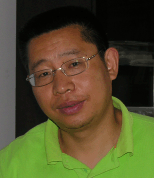
|
name:Deng-Cai Liu
|
|
|
education:PhD
|
professional title:Professor
|
|
duty:Dean
|
telephone:86-28-82650312
|
|
email: dcliu7@yahoo.com
|
fax:86-28-82650350
|
Resume:
Professor Deng-Cai Liu received his bachelor, master and doctor
degree of agronomy from Sichuan Agricultural University in 1992, 1995,
and 1998. From Oct. 2002 to Sep. 2003, he was a visiting scholor of
South Dakota State University in USA. Since 1995, he has been working in
wheat genetics, breeding, and germplasm in Triticeae Research Institute
of Sichuan Agricultural University. He obtained awards, including
Second-class Prize of Natural Science Award by the central people's
government of the People's Republic of China in 2000, and First-class
Prize of Sci-tech Advance Award by the People's Government of Sichuan
province of China in 1999 and 2006. More than 200 papers have been
published. Nine new common wheat cultivars have been released and used in
the wheat production.
Research Interests:
1. Wide hybridization and allopolyplodization between wheat and
other species and its utilization on genetics and breeding of wheat.
(1) the genetic bases on the production, homoelogous chromosome
pairing, the formation of unreduced gametes in wheat-alien hybrids;
(2) the variation induced in the wheat-alien hybrids and its molecular mechanism;
(3) its utilization in new genotype developing.
2. Developing new cultivars with high yield, good quality, and resistance to diseases.
Recent book chapters:
1. Allopolyploidy and interspecific hybridization for wheat improvement. In: Annaliese S. Mason ed. Polyploidy and Hybridization for Crop Improvement. CRC Press, p27-52, 2016.
2. Distant Hybridization: A tool for interspecific manipulation of chromosomes. In Alien Gene Transfer in Crop Plants, Volume 1 (pp. 25-42). Springer New York, 2014.
Recently selected papers:
1. Recurrent selection for wider seedling leaves increases earlybiomass and leaf area in wheat (Triticum aestivum L.). Journal of Experimental Botany, 2015, 66:1215–1226.
2. Making the bread: insights from newly synthesized allohexaploid Wheat. Molecular Plant, 2015, 8:847-859.
3. Overexpression of a NAC transcription factor delays leaf senescence and increases grain nitrogen concentration in wheat. Plant Biology, 2015, 17:904-913.
4. Genome-wide characterization of developmental stage-and tissue-specific transcription factors in wheat. BMC Genomics, 2015, 16(1), 125.
5. Quantitative trait locus mapping for growth duration and its timing components in wheat. Molecular Breeding, 2015, 35:44.
6. Divergence in homoeolog expression of the grain length-associated gene GASR7 during wheat allohexaploidization. The Crop Journal, 2015, 3(1): 1-9.
7. mRNA and small RNA transcriptomes reveal insights into dynamic homoeolog regulation of allopolyploid heterosis in nascent hexaploid wheat. Plant Cell (2014) 26: 1878–1900.
8. QTug. sau-3B Is a Major Quantitative Trait Locus for Wheat Hexaploidization. G3: Genes|Genomes|Genetics 2014 4(10): 1943-1953.
9. The detection of a de novo allele of the Glu‑1Dx gene in wheat-rye hybrid offspring. Theor Appl Genet (2014) 127:2173–2182.
10. Population structure and linkage disequilibrium in six-rowed barley landraces from the Qinghai-Tibetan Plateau. Crop Sci. (2014) 54:2011–2022.
11. Amphitelic orientation of centromeres at metaphase I is an important feature for univalent-dependent meiotic nonreduction. Journal of Genetics (2014) 93(2):531-534.
12. Production of hexaploid triticale by a synthetic hexaploid wheat-rye hybrid method. Euphytica, 193:347-357, 2013.
13. Stripe rust resistance in Aegilops tauschii germplasm. Crop Science, 53:2014-2020, 2013.
14. In situ hybridization analysis indicates that 4AL-5AL-7BS translocation preceded subspecies differentiation of Triticum turgidum L. Genome, 56:303-305, 2013.
15. Microsatellite mutation rate during allohexaploidization of newly resynthesized wheat. International Journal of Molecular Sciences, 13:12533-12543, 2012.
16. Genetic map of Triticum turgidum based on a hexaploid wheat population without genetic recombination for D genome. BMC Genetics, 13:69, 2012.